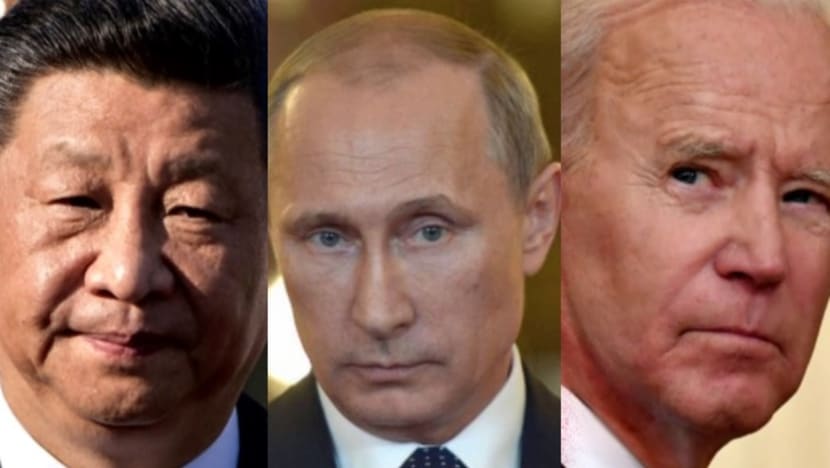Commentary: Beijing will draw conclusions from Washington’s reaction to Russia on Ukraine
Ukraine is not Taiwan, but Russia’s actions, and more importantly Washington’s response, may hold lessons for East Asia, says Christian Le Miere.

China may be taking notes on US action towards Russia on Ukraine. (Photos: AFP)
LONDON: As Russian troops gather to the east of Ukraine, Europe is desperately trying to garner whether an invasion is likely and how to prevent it.
In Asia, the potential invasion of Ukraine has fewer direct strategic effects, but it does have comparative points of interest for the region’s own flashpoints.
Two in particular stick out: Whether the US will be able to deter Russian aggression or support Ukraine if necessary, and how the push towards deepening alliances is inherently destabilising.
ALLIANCES CAN BE STABLISING AND DEBSTABILISING
Ukraine is not Taiwan. The history, status, geography and many other factors make the two entities highly distinct.
Russian intervention in Ukraine does not make Chinese intervention in Taiwan any more or less likely.
Nonetheless, Ukraine offers a useful data point for other areas of tension in Asia.
Similarities abound. In Europe, a larger state with a desire to exert influence over its near-abroad – Russia – has seen the encroachment of a mutual defence alliance – the North Atlantic Treaty Organization (NATO) – into countries it has historical suzerainty over.
In Asia, China is also viewing with concern how the US is strengthening its alliances and defence relationships with entities in dispute with Beijing, from Taiwan to Japan and Vietnam.
The European example suggests that a mutual defence alliance such as NATO can be a stabilising factor in geopolitics once it has been created.
NATO and the Soviet Union had some testy moments in Cold War history, such as the Able Archer exercise in 1983 that reportedly led some members of the Politburo to believe that a nuclear strike was imminent. But the creation of NATO also provided Western Europe with the military support necessary from the US to effectively deter Soviet aggression.
While such alliances can thus be stabilising, the process of alliance creation can be destabilising. The change in status quo and shift in relative power creates security concerns in one or more parties.
In the current context, the expansion of NATO to the Baltic states may have bolstered their security, but Moscow’s reaction to further expansion to states such as Ukraine and Georgia, which are historically and culturally closer to Russia, demonstrates how alliance formation can threaten peace.
The window between indicating a change in the alliance and actual creation of that alliance presents an opportunity for rivals to try and affect the outcome to their liking.
The fact that Russia is willing to make such overt threats of massive violence in fact demonstrates the utility of NATO membership to these states – were they already members like the Baltic states, such threats would be much higher-risk for Moscow, and the prospect of them becoming so ensconced in NATO’s security bubble makes Moscow so nervous that it will threaten war now.
The other side of the Eurasian landmass, similar dynamics may now be playing out.
Concern over Chinese aggression has led the US to deepen its relationships with key allies in the region, such as Australia through the new trilateral AUKUS defence relationship, broaden its strategic connection to new partners, such as India through the nascent Quad grouping, and offer a less ambiguous posture towards disputed territories, such as in the East and South China Seas by affirming that the mutual defence treaties with Japan and the Philippines apply to these small islands.
One such example of this change in US alliance posture in the region is Taiwan, where Washington has augmented its diplomacy and offered greater rhetorical support.
In October, President Biden seemed to indicate that the US has “a commitment” to defend Taiwan, suggesting a reduction in the strategic ambiguity the US has used for the past three decades to help deter China, even as the White House subsequently downplayed this shift.
For Beijing, the possibility that the US might more directly deploy its forces to defend Taiwan complicates its own defence planning and makes a campaign to reincorporate the island much more challenging.
As such, this incremental alliance formation is for the time being a destabilising factor in cross-strait relations, unless and until the US is able to demonstrate a more solid deterrence capability and commitment to Taiwan’s defence.
US RESOLVE TESTED
Ukraine may also stand as a useful lesson for East Asia as it reflects on US resolve to defend partners and deter rivals.
In response to the Russian build-up, the US has threatened punishing sanctions and support for Ukraine’s military, including a potential post-invasion insurgency, should Moscow invade.
The US’ overall reaction to Russia’s actions will set the tone for its relationship with Moscow, but also provide indicators for Beijing.
Three factors are worth considering: Whether or not the US is able to deter Russia; whether US resolve to defend Ukraine is robust and whether Washington is willing to make concessions to Russia’s demands to prevent conflict.
But Ukraine is not Taiwan and these facets are not directly comparable between the two theatres. The disposition of US forces in the western Pacific and stronger rhetoric around the defence of Taiwan against what Washington currently considers is its primary competitor means that calculations over Taiwan are very different to those over Ukraine.
Nevertheless, the danger exists that a feeble response by the US may be seen as encouragement in Beijing to consider riskier actions in a range of theatres.
STABILITY IN EAST ASIA NOT COMPARABLE WITH SITUATION IN UKRAINE
Russia’s calculations and risk appetite are not the same as Beijing’s, Washington’s resolve and incentive to defend Ukraine is not the same as for Taiwan, and a land-based operation to intervene in Ukraine is very different to an amphibious invasion of Taiwan.
Nevertheless, the US’ actions in one part of the world can affect decision making in another. Should Beijing consider Washington’s response to be timid, weak or lacking resolve, it might change the way it considers its options in the South China Sea, East China Sea or Taiwan.
If the US is willing to allow Russia to bully and invade its neighbour, and a potential NATO country at that, would it be perturbed by China taking further islands in the South China Sea from Vietnam or Taiwan in a limited operation?
The events in eastern Europe thus suggest two risks for East Asia. The first is that the process of alliance formation between the US and other East Asian entities, in particular Taiwan, is potentially destabilising, presenting to China a window when US readiness and resolve to defend allies is weaker than a likely future point.
The second is that while Ukraine and Taiwan may differ too much for there to be solid takeaways for Beijing when considering an invasion of the island, there are a range of other potential operations that China could launch to extend its control over its near seas.
So, the thinking may be in Beijing, if Washington is not willing to risk too much for Ukraine, would it really risk everything for tiny islands thousands of miles from its shores?
Christian Le Miere is a foreign policy adviser and the founder and manging director of Arcipel, a strategic advisory firm based in London.




















